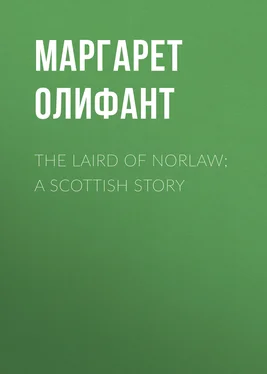Маргарет Олифант - The Laird of Norlaw; A Scottish Story
Здесь есть возможность читать онлайн «Маргарет Олифант - The Laird of Norlaw; A Scottish Story» — ознакомительный отрывок электронной книги совершенно бесплатно, а после прочтения отрывка купить полную версию. В некоторых случаях можно слушать аудио, скачать через торрент в формате fb2 и присутствует краткое содержание. Жанр: foreign_prose, literature_19, foreign_antique, на английском языке. Описание произведения, (предисловие) а так же отзывы посетителей доступны на портале библиотеки ЛибКат.
- Название:The Laird of Norlaw; A Scottish Story
- Автор:
- Жанр:
- Год:неизвестен
- ISBN:нет данных
- Рейтинг книги:3 / 5. Голосов: 1
-
Избранное:Добавить в избранное
- Отзывы:
-
Ваша оценка:
- 60
- 1
- 2
- 3
- 4
- 5
The Laird of Norlaw; A Scottish Story: краткое содержание, описание и аннотация
Предлагаем к чтению аннотацию, описание, краткое содержание или предисловие (зависит от того, что написал сам автор книги «The Laird of Norlaw; A Scottish Story»). Если вы не нашли необходимую информацию о книге — напишите в комментариях, мы постараемся отыскать её.
The Laird of Norlaw; A Scottish Story — читать онлайн ознакомительный отрывок
Ниже представлен текст книги, разбитый по страницам. Система сохранения места последней прочитанной страницы, позволяет с удобством читать онлайн бесплатно книгу «The Laird of Norlaw; A Scottish Story», без необходимости каждый раз заново искать на чём Вы остановились. Поставьте закладку, и сможете в любой момент перейти на страницу, на которой закончили чтение.
Интервал:
Закладка:
The youngest boy sat by the table, leaning over a large family Bible, full of quaint old pictures. Cosmo saw the pictures without seeing them—he was leaning both his elbows on the table, supporting his head with a pair of long, fair hands, which his boy’s jacket, which he had outgrown, left bare to the wrists. His first agony of grief had fallen into a dull aching; his eyes were observant of the faintest lines of those familiar wood-cuts, yet he could not have told what was the subject of one of them, though he knew them all by heart. He was fair-haired, pale, and delicate, with sensitive features, and dark eyes, like his father’s, which had a strange effect in contrast with the extreme lightness of his hair and complexion. He was the tender boy—the mother’s child of the household, and it was Cosmo of whom the village gossips spoke, when they took comfort in the thought that only his youngest son was like Norlaw.
Next to Cosmo, sitting idly on a chair, watching how a stream of confined sunshine came in overhead, at the side of the blind, was Huntley, the eldest son. He was very dark, very ruddy, with close curls of black hair, and eyes of happy hazel-brown. Heretofore, Huntley Livingstone’s principal characteristic had been a total incapacity to keep still. For many a year Marget had lamented over him, that he would not “behave himself,” and even the Mistress had spoken her mind only too often on the same subject. Huntley would not join, with gravity and decorum, even the circle of evening visitors who gathered on unfrequent occasions round the fireside of Norlaw. He had perpetually something on hand to keep him in motion, and if nothing better was to be had, would rummage through lumber-room and family treasury, hunting up dusty old sets of newspapers and magazines, risking the safety of precious old hereditary parchments, finding a hundred forgotten trifles, which he had nothing to do with. So that it was rare, even on winter evenings, to find Huntley at rest in the family circle; it was his wont to appear in it at intervals bringing something with him which had no right to be there—to be ordered off peremptorily by his mother with the intruding article; to be heard, all the evening through, knocking in nails, and putting up shelves for Marget, or making some one of the countless alterations, which had always to be made in his own bed-chamber and private sanctuary; and finally, to reappear for the family worship, during which he kept as still as his nature would permit, and the family supper, at which Huntley’s feats, in cutting down great loaves of bread, and demolishing oat-cakes, were a standing joke in the household. This was the old Huntley, when all was well in Norlaw. Now he sat still, watching that narrow blade of sunshine, burning in compressed and close by the side of the blind; it was like his own nature, in those early days of household grief.
Patrick was a less remarkable boy than either of his brothers; he was most like Huntley, and had the same eyes, and the same crisp, short curls of black hair. But Patrick had a medium in him; he did what was needful, with the quickest practical sense; he was strong in his perception of right and justice; so strong, that the Quixotry of boyish enthusiasm had never moved him; he was not, in short, a describable person; at this present moment, he was steadily occupied with a volume of sermons; they were extremely heavy metal, but Patrick went on with them, holding fast his mind by that anchor of heaviness. It was not that his gravity was remarkable, or his spiritual appreciation great; but something was needful to keep the spirit afloat in that atmosphere of death; the boys had been “too well brought up” to think of profaning the Sabbath with light literature; and amusing themselves while their father lay dead was a sin quite as heinous. So Patrick Livingstone read, with a knitted brow, sermons of the old Johnsonian period, and Cosmo pondered the quaint Bible woodcuts, and Huntley watched the sunshine; and they had not spoken a word to each other for at least an hour.
Huntley was the first to break the silence.
“I wish to-morrow were come and gone,” he exclaimed, suddenly, rising up and taking a rapid turn through the room; “a week of this would kill me.”
Cosmo looked up, with an almost feminine reproof in his tearful black eyes.
“Well, laddie,” said the elder brother; “dinna look at me with these e’en! If it would have lengthened out his days an hour, or saved him a pang, would I have spared years to do it? but what is he heeding for all this gloom and silence now?”
“Nothing,” said the second brother, “but the neighbors care, and so does my mother; it’s nothing, but it’s all we can give—and he would have heeded and been pleased, had he thought beforehand on what we should be doing now.”
It was so true, that Huntley sat down again overpowered. Yes, he would have been pleased to think of every particular of the “respect” which belonged to the dead. The closed houses, the darkened rooms, the funeral train; that tender human spirit would have clung to every one of them in his thoughts, keeping the warmth of human sympathy close to him to the latest possibility, little, little though he knew about them now.
“What troubles me is standing still,” said Huntley, with a sigh. “I can not tell what’s before us; I don’t think even my mother knows; I believe it’s worse than we can think of; and we’ve neither friends, nor money, nor influence. Here are we three Livingstones, and I’m not twenty, and we’ve debts in money to meet, and mortgages on the land, and nothing in the world but our hands and our heads, and what strength and wit God has given us. I’m not grumbling—but to think upon it all, and to think now that—that he’s gone, and we’re alone and for ourselves—and to sit still neither doing nor planning, it’s that that troubles me!”
“Huntley, it’s Sabbath day!” said Cosmo.
“Ay, I ken! it’s Sabbath and rest, but not to us,” cried the young man; “here’s me, that should have seen my way—I’m old enough—me that should have known where I was going, and how I was going, and been able to spare a hand for you; and I’m the biggest burden of all; a man without a trade to turn his hand to, a man without knowledge in his head or skill in his fingers—and to sit still and never say a word, and see them creeping down, day by day, and every thing put back as if life could be put back and wait. True, Patie! what would you have me do?”
“Make up your mind, and wait till it’s time to tell it,” said Patie, without either reproof or sympathy; but Cosmo was more moved—he came to his eldest brother with a soft step.
“Huntley,” said Cosmo, in the soft speech of their childhood, “what makes ye speak about a trade, you that are Livingstone of Norlaw? It’s for us to gang and seek our fortunes; you’re the chief of your name, and the lands are yours—they canna ruin you , Huntley. I see the difference mysel’, the folks see it in the country-side; and as for Patie and me, we’ll seek our fortunes—we’re only the youngest sons, it’s our inheritance; but Norlaw, and home, and the name, are with you.”
This appeal had the strangest effect upon Huntley; it seemed to dissipate in an instant all the impatience and excitement of the youth’s grief; he put his arm round Cosmo, with a sudden melting of heart and countenance.
“Do ye hear him, Patie?” cried Huntley, with tears; “he thinks home’s home forever, because the race has been here a thousand years; he thinks I’m a prince delivering my kingdom! Cosmo, the land’s gone; I know there’s not an acre ours after to-morrow. I’ve found it out, bit by bit, though nobody said a word; but we’ll save the house, and the old castle, if we should never have a penny over, for mother and you.”
Читать дальшеИнтервал:
Закладка:
Похожие книги на «The Laird of Norlaw; A Scottish Story»
Представляем Вашему вниманию похожие книги на «The Laird of Norlaw; A Scottish Story» списком для выбора. Мы отобрали схожую по названию и смыслу литературу в надежде предоставить читателям больше вариантов отыскать новые, интересные, ещё непрочитанные произведения.
Обсуждение, отзывы о книге «The Laird of Norlaw; A Scottish Story» и просто собственные мнения читателей. Оставьте ваши комментарии, напишите, что Вы думаете о произведении, его смысле или главных героях. Укажите что конкретно понравилось, а что нет, и почему Вы так считаете.












